David Muir Is on the Move
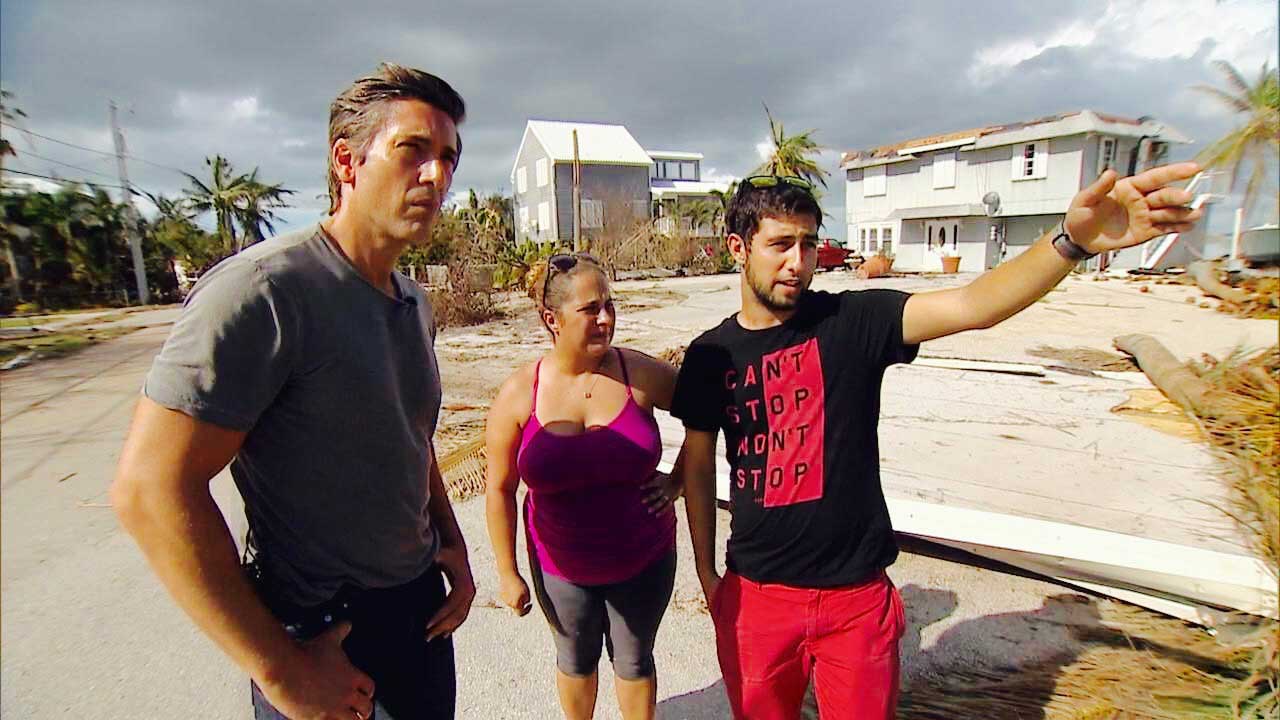
The smarter way to stay on top of broadcasting and cable industry. Sign up below
You are now subscribed
Your newsletter sign-up was successful
Why This Matters: As ABC marks 70 years of evening newscasts, World News Tonight anchor David Muir is helping fuel the show’s upwards rating trajectory.
As ABC’s evening newscast approaches its 70th anniversary, it has considerable momentum. With David Muir anchoring World News Tonight, the 6:30 p.m. program is averaging 8.65 million total viewers this year, up 5% from the same point last year. In the 25-54 demo, World News Tonight is up 4%.
Muir officially slid into the World News Tonight chair in September of 2014, succeeding Diane Sawyer as anchor and managing editor. He’s made his mark in evening news, frequently flying out of New York on weekends to check out what he deems to be an underreported story in Jordan, Syria, Somaliland or some other far-off point.
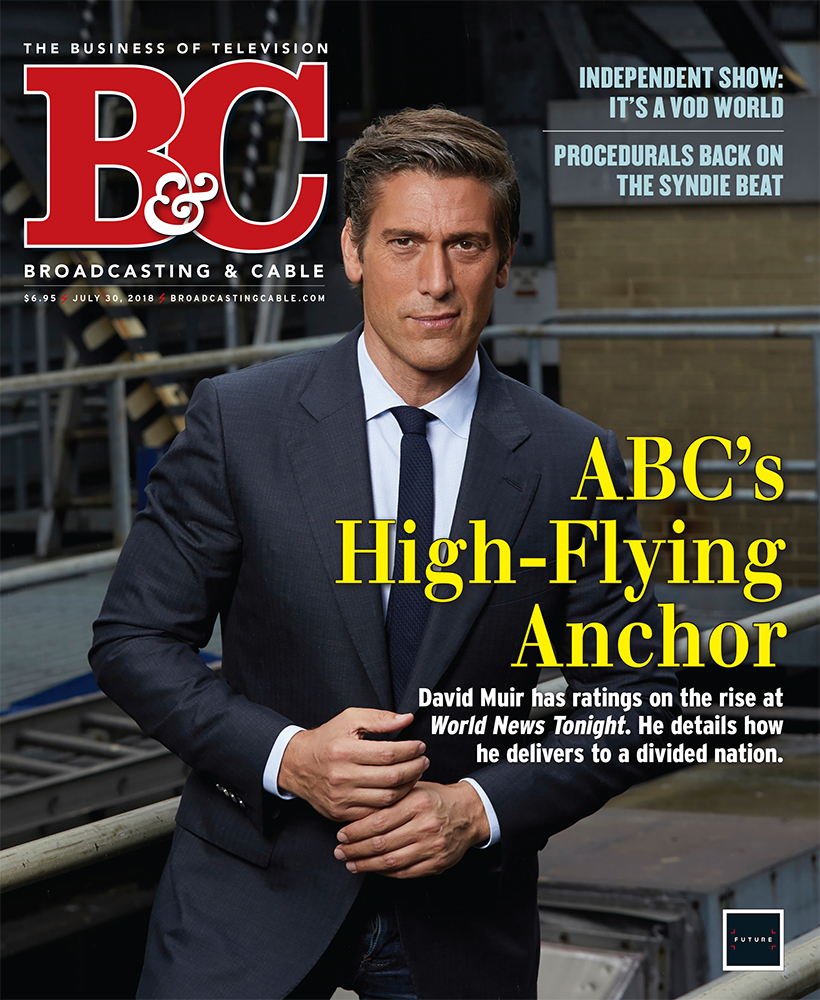
“I’m not just the guy who sits there at the desk,” he said.
World News Tonight colleagues describe Muir as a highly engaged anchor with a hand in all aspects of the newscast. They also mention an extraordinary ability to connect with viewers. “He connects with the audience like no other anchor,” Almin Karamehmedovic, executive producer of the newscast, said. “David has a unique capability to connect with people across the board.”
Muir grew up in Syracuse, N.Y., and mentions his love for TV news being such that, as a boy, he would bid goodbye to his friends as they played outside to sneak in and watch the evening news. When he was 12, Muir wrote a letter to his favorite anchor, WTVH Syracuse’s Ron Curtis (“the Walter Cronkite of my town,” Muir said), then landed an internship at WTVH when he was 13 or 14. Returning to the station each year when school ended, Muir would be led to a doorway covered in pencil marks, where station colleagues would measure how much he’d grown.
“I was carrying the tripod and ripping the scripts when we had like 5-ply paper for the anchors, and fetching their Cokes out of the Coke machine,” Muir said.
The smarter way to stay on top of broadcasting and cable industry. Sign up below
ABC News president James Goldston said Muir’s passion for TV news has not subsided since his childhood. “Pretty much every waking moment of David’s life is dedicated to telling stories — stories of the world,” Goldston said. “His passion and enthusiasm and dedication, every single second, is really incredible to witness.”
World News Tonight is growing at a time when few broadcast programs can claim that. NBC Nightly News, leader in the demo races, is flat in total viewers year to date, and minus 3% in viewers 25-54. CBS Evening News is off 5% in total viewers and down 9% in viewers 25-54.
The ABC 6:30 show’s 70th anniversary — it debuted as News and Views — arrives Aug. 11. (The CBS and NBC evening newscasts turned 70 earlier this year.)
Muir’s ratings-grabbing interviews include President Donald Trump, Pope Francis, Hillary Clinton and President Barack Obama. He spoke with B&C about the newscast’s history, its resurgence and what’s next. An edited transcript follows.
Which news anchor do you consider a major influence?
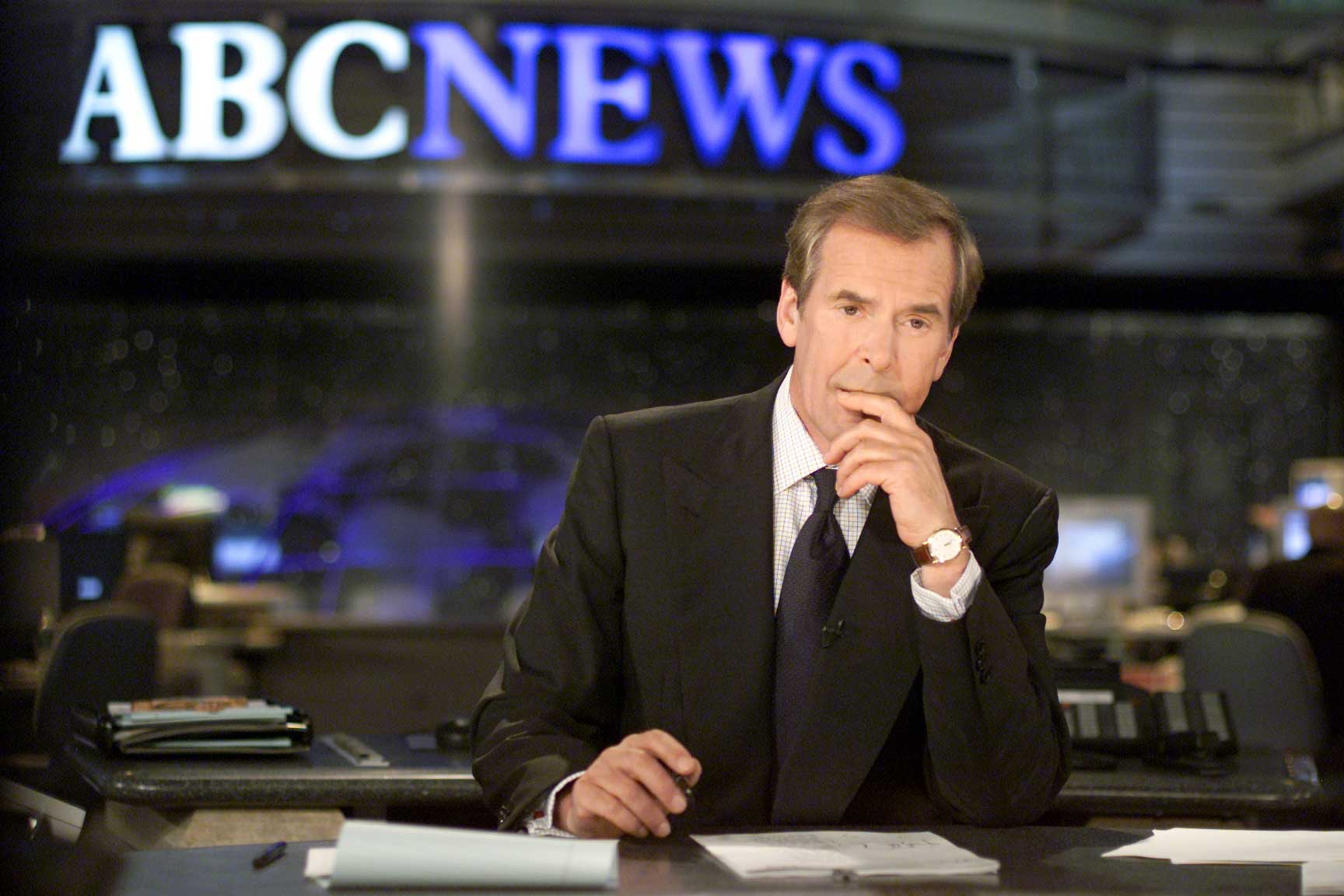
I was incredibly lucky to have arrived at ABC when Peter Jennings was still the anchor of World News Tonight. Charlie [Gibson] and Diane [Sawyer] were the anchors of Good Morning America and I had a chance to report for Peter on his broadcast. I still remember the first time he called me out in the field. With Charlie, I remember the night covering the war with Hezbollah in Israel, and we were getting ready to go on. Right before air, the Avid editing system crashed, and my story crashed with it. So the executive producer gets into my ear in sort of a panic. They opened up Charlie’s microphone and he said, ‘We’re just going to have a conversation.’ And I said, ‘I’m ready, let’s do it.’ The open played and it was just Charlie and me for a significant amount of time, right off the top of the broadcast.
I remember when I was hired here, I was a week into the job, and it was the blackout of the Northeast. They’d hired me to be the overnight anchor and a correspondent. I was anchoring when the blackout happened. We had very little power in the building — we were operating on generators and there was no teleprompter and no monitors so I couldn’t see what was actually airing.
I was on the air for hours. Times Square was dark, so they brought the Good Morning America team uptown. And I remember, when I signed off after hours of this coverage and said, ‘For many of you, Good Morning America is next,’ people in the newsroom stood up and started clapping. I turned around and it was the Good Morning America team and I couldn’t believe it. I mean, it was Charlie and Diane and the team. After that, I felt as though I was off and running here.
What about TV news appealed to you as a child? Were you a curious kid, a storyteller?
I was a curious child and I was also a storyteller. My mom would come home from work and say, ‘just give me five minutes,’ because I’d be waiting at the front door every day with my list of stories.
It was also the travel. With local news, they’re not traveling the world; they did some international reporting but certainly not at the level you see at the networks. But I was drawn to that. I thought this could be a way to go out there and see the world.
I vividly remember getting in those news cruisers on James Street in Syracuse and going out to the severe storms in Oswego County or the Syracuse Common Council meetings. I would get in the back of that cruiser whenever they would let me go. I think back to being the kid in the back of that car and I’m grateful to those photographers and reporters for allowing me to come along for the ride. That’s why we have people here almost every night, watching the news — generally young people who reach out to me. Because I remember they did that for me and it made all the difference.
You spend many weekends out of the country, chasing down stories. Why is that important to you?
The day to day is extremely important and we have a responsibility to cut through it all for people. There’s a lot of noise, a lot of incoming all day long for people with their iPhones and email and the headlines. But so much of my DNA is being out in the field and reporting. When I got this job, one of the things I said to the bosses was, I still want to be out there. They just sort of smiled back at me because, in essence, I think that’s one of the reasons why they gave me the opportunity to do this job. We started taking the newscast on the road immediately.
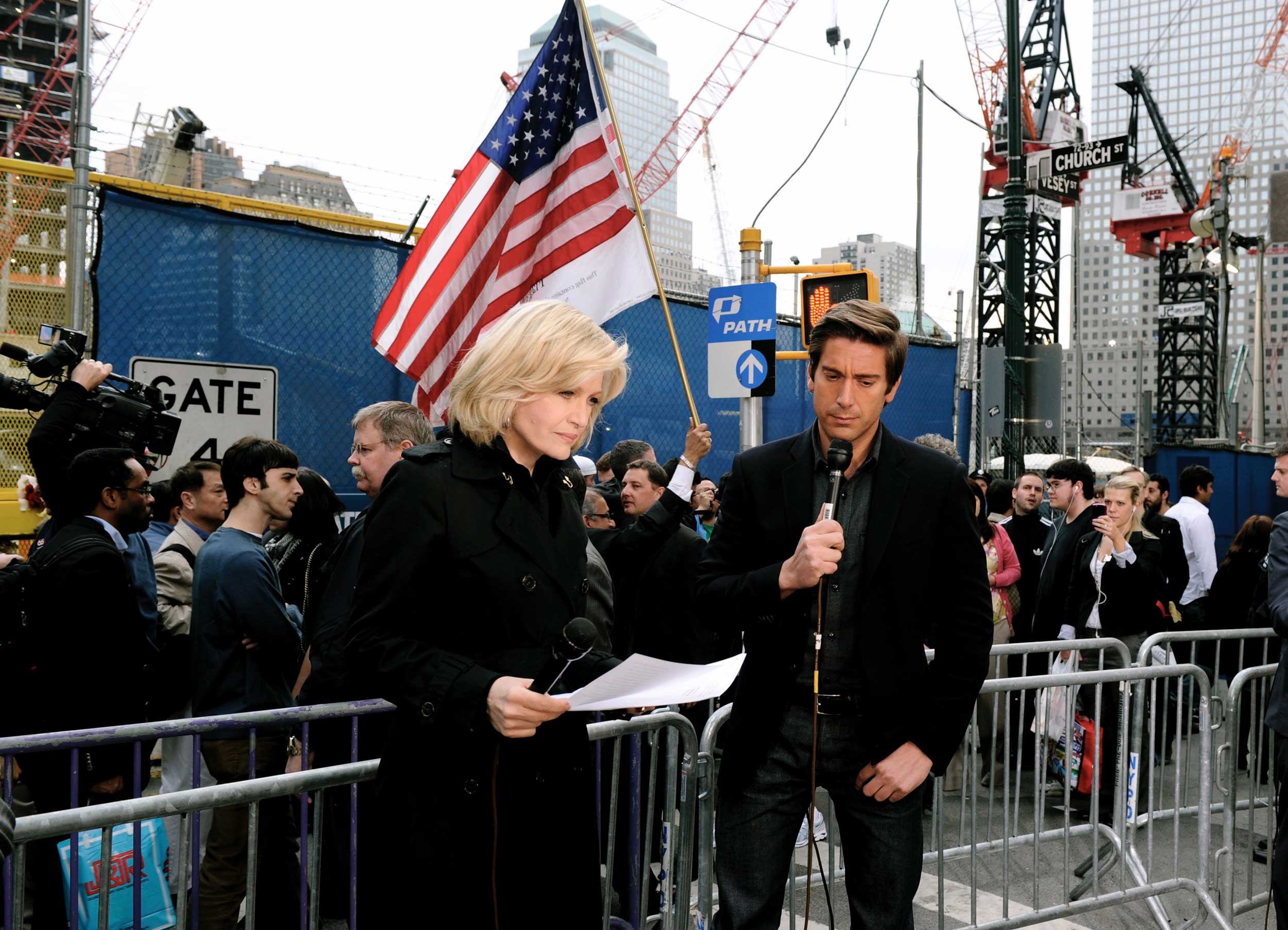
The weekend trips are important because not only does it fuel me, but I think it’s the DNA of the newscast. Over time, if I wasn’t out there doing the same kind of reports viewers saw me doing for a decade, reporting for Peter and then Charlie Gibson and then Diane Sawyer, they would wonder, what happened to that guy?
In this moment, in this polarized country, to be the one that has this conversation with America is something that I don’t take lightly or for granted. But I still love being away from that desk.
How much do you think about how best to attract young people to the newscast?
Honestly, I don’t really think about it in terms of young people or older people. What we try to do every night is put a newscast on the air that doesn’t leave much on the table, and that’s my guiding principle. The newscast is a living, breathing thing. It evolves all day long. In this era, we often throw out the lead piece less than an hour before air — the headlines change right up until the moment we’re on the air. You have to be nimble. You have to be ready.
Our lead stories are often three to four minutes long. I always say, ‘Don’t worry about time. Let’s just write this piece and figure out if, at the end, we’ve done our job accurately reflecting what really happened today and helping people break through the noise so they have what they need to decide how they feel about it.’
I hope that reaches everyone. I don’t like to break it down into age groups. I do think that people are interested in democracy and in what we’re witnessing in Washington. One of the positive things to come out of what was one of the most contentious, if not the most contentious, election of our lifetime, is an electorate and an American people who are watching a lot more closely afterwards than perhaps they did for many years.
It’s WNT’s largest viewership in 13 years. What do you attribute the gains to?
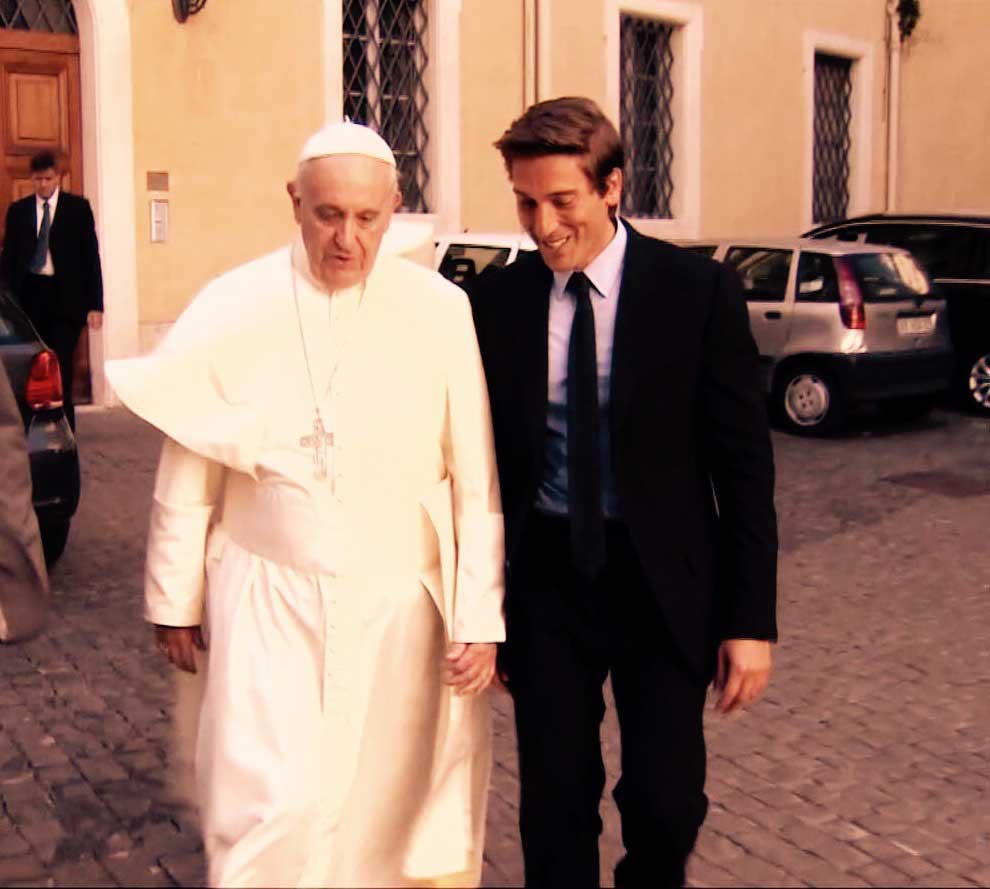
First of all, I’m grateful the audience is responding. I recognize that we’re in an industry where most everything is shrinking. And I think what it indicates is that there is a real hunger out there. It reminds us every single night how important it is, the job that we’re doing right now in this moment in our country.
I hope it’s a reinforcement that people somehow are recognizing that we really are trying our best to recognize that it is a divided country. It really is half the country saying, ‘Give him a chance,’ and the other half saying, ‘How on earth did this happen?’ But everyone wants us to make sense of it all. The responsibility that comes with that is enormous. But it is a privilege to try to cut through it and carefully guide people through it. And I hope our audience is a reflection of them finding a newscast that they sense is trying its best, that is more accessible than maybe even newscasts of just a few years ago.
I hope that they sense, at the end of the newscast, that we are in it together. I love this country as much as they do and I love those stories and I love seeing the smiles or the tears at the end of the newscast. And I love that people are reaching out to one another. So there is a lot that’s dark, but there’s also still a lot that’s not. I think that people are seeing that we’re seeing that, too.
What do you see yourself doing 10 years from now?
That’s a good question.
Local news up in Syracuse?
Well, I love going home. I still check Syracuse.com during the day.
There are any number of jobs out there that, in this changing media landscape, [offer] the opportunity to do long form, which I do on 20/20. A couple of projects over the last couple of years stand out to me. We were following heroin and opioids’ effect in this country. Our departure point was New Hampshire and I did a primetime hour and we reported on World News Tonight leading up to the election, on heroin in America.
I did a Nightline special on Syrian refugees who’d come to America and just happened to come with this election playing out, with talk about whether we should bring down the number of Syrian refugees and refugees in general. It wasn’t a political statement at all, but it was a really interesting opportunity to see what it’s like for these families who have come to America with this American dream and they’ve escaped war and what have you to live here with such hope. Then to watch them watch the debates and the political rhetoric play out in America — it’s such a fascinating portrait. We had no idea that it would unfold the way it did and become such a key issue leading up to the election.
Those were all major stories leading up to the election that didn’t get probably as much reporting as they deserved because of the day to day. Americans were almost binge-viewing the election because every day there was a major headline that would drop. It was like each day was its own Netflix episode. What I kept trying to do was not take my eye off the ball on the day to day, but also do long form over the course of time. That’s why we did the heroin reporting and the Syrian refugee reporting and a story on Guantanamo Bay.
I have a list of things that I would love to dive into that sometimes the day to day just doesn’t allow you to do. It’s a great wish list to have, but I don’t take for granted having the opportunity to do this job every single day.
What’s a recent story on World News Tonight that made you really proud?
Given the craziness of the news cycle that we're in right now, one of the things that you realize when you get this job is that people expect you to be there Monday through Friday at 6:30. And so my opportunity to get out there in the world and do some enterprise reporting comes on the weekends. One of the stories we did that I was particularly proud of was our weekend trip to Somaliland to report on the famine. I wondered, given the climate of our country right now, if the heaviness of that story would just be piling on for our audience. We brought the story back and I put it on the air. Within a couple of days we raised $1.8 million.
That certainly wasn't our intention. That's not why we go. But it is evidence of the generosity of our viewers and a powerful reminder that, even given the political climate in our country right now, people are interested in the world around them.
I always say that when we do a story like that and there are children in need, if at the end of the story we don't give some sort of tool or way in which a viewer can actually help out, then we leave them hanging. In that particular instance we gave viewers a couple different ways they could help out. I thought it was a nice reminder of just how interested our viewers are in the world around them and how generous they are.
Giving viewers a way to help out—is that a new thing for World News Tonight?
It's not. It’s a reflection of the times we're in. When I was a kid in the backyard and we'd be outside playing, I'd excuse myself to come inside to watch the local news and then Peter Jennings. What drew me to him was, you could tell that he had this curiosity and this thirst to travel the world--he was sort of the James Bond of the evening news. But there was something else, his conversational style--this conversation with America he was having every night. One of the things that I think about to this day, I still can't believe that I get to have that conversation.
The conversation is different in that it's a two-way conversation because people can reach out to you through social media. It’s a much more accessible newscast now. And so if you go to Somaliland and do a story on famine and you show the stories affecting families and children who are lined up for hours a day waiting to get water--if you don't at the end of the story, offer people the tools to help, then you're not telling the full story. People will tweet you, they will write you on Facebook. They will say, Why didn't you tell us how we can help? Is there a way to help? So it's really an anticipation of what people are going to ask you anyway.
Was there a story recently that you'd like to have back—one that fell flat or didn't represent the news brand well?
I hate to say the answer is no, because at the end of every newscast there's always something that you think, well, I wish we had a little more time on that, or I wish we had asked that a little differently. That’s a more accurate reflection of being self-critical. The team will tell you that I am probably the most critical of what we do. But just given the amount of news coming at us in these times, there really isn't much room for stories that don't break through to the level of what should earn its place.
“Made in America” is where I travel the country, go to these towns, find someone who had an American idea and was determined to make it here. Oftentimes they've got their local community cheering them on. We all know the economics of making it here versus elsewhere and some of that equation has started to work in their favor over the course of years. That series took off in a way that no one could have predicted.
“America Strong” is a way of ending the newscast every night in a tumultuous time by signaling that we’re in this together and we’ll tackle it again tomorrow night.
We had one [in mid-July] with Walter Carr from Alabama. This is one that I wanted to do even more on. He’s a young man who wants to go to school, would love to be a U.S. Marine one day, and he gets a job with a moving company. His car breaks down the night before and he starts walking overnight to get to the job in the morning, the house he has to pack up. He starts after midnight and he gets to the house, and when they hear about this story they're so moved by this young man. Within a couple of days, the owner of the moving company decides, I’m going to give him this car.
I hope that sends a signal at the end of the newscast. It might sound a little too hopeful but I really do believe--when I go out and do these stories I always hear the same sorts of themes, that we have more in common than what divides us.
Tell me about the letter you sent to your favorite anchor as a boy. What did you say?
I said I hope to be a broadcast journalist one day and what kind of advice would he have for a 12-year-old to one day have his job? He wrote back from his newsroom typewriter, this kind letter, and the last line said something like, competition in television news is keen. There's always room for the right person. It could be you. Then I reached out to visit the station and visited the newsroom and I began interning almost right away.
I think the only reason I was able to get my foot in the door was because they were in between news directors at the time and there was no boss to say, what is this kid doing in our newsroom?
Did you continue working at TV stations throughout your teens?
I did. I went to a college which wasn't too far from home and got a journalism degree. I did a semester at Georgetown, this political journalism program. I went overseas and did a semester in Spain at the University of Salamanca, which was total Spanish immersion and a complete break from journalism, since I'd done that since I was 13.
Then I came back and they hired me my second semester of senior year at Ithaca to be the weekend anchor/reporter. I would drive to Syracuse from Ithaca on the weekends to anchor, produce and write the newscast.
I had a yellow stopwatch and I would time the newscast underneath the desk because you would have sports run-over on the weekends. It was the job that prepared me so much for what we do every single night here. You get thrown right in and make your mistakes and you're forced to be able to do it all—produce, write, report and do some anchoring.
I had no right to be there, I'm sure, at 21 years old. But I was grateful for the opportunity and they literally watched me grow up.
Jeff Glor of CBS Evening News interviewed President Trump twice in the span of five days recently. Why is the president sitting with CBS News but not as frequently with ABC?
I was the first interview right after he was elected. We did two interviews with him at the White House. One was in the Blue Room, and then later in the day we did a walk-through of the White House. That was our second interview, where we did the Colonnade and then the Oval Office.
What did you learn from interviewing the president?
It wasn't the first time—I had interviewed him on the campaign trail. But it was my first time interviewing him as president. I remember his willingness to let us come to the White House so soon into the presidency. The inauguration had just taken place. We had the opportunity to walk through a significant part of the White House with him. I'd asked him, is there anything that keeps you up at night? I’d asked if he was worried about the power of making the decisions—of being given the biscuit, I think it's called, with the nuclear codes--and whether that keeps him up at night. And I was struck--just a few days into the job, he said it did not keep him up at night, that he was he was up for the task. That left me with an impression.
I remember him telling us about the letter that President Obama had left him, which is a tradition that dates back to Ronald Reagan, leaving a letter for whoever comes after you. He pulled out the letter and opened it and I could see it was several paragraphs long. But that was as close as I got to it. He said, I'm sure you would love to read it. Then he put it back in the envelope.
What do you do to unwind?
I like to travel. It sounds like I do a ton of traveling with this job, but you’re in Helsinki for 24 to 48 hours, and you’re consumed by what is unfolding on the world stage. I still go home, go upstate. I like to breathe fresh air and see the rolling hills and be reminded of where I came from.
I love New York City. I love living here, the food. I try to exercise every day. That’s my outlet to decompress and clear my head.
I love to read and try to read as much as I can. I read so much of the news all day and every day, so I've been veering a little bit more towards fiction.
At 6:29 p.m., what’s going through your mind?
I will have likely just gotten to the set. The last hour is the craziest. Whether you're ready or not, that open is going to play at 6:30.
I'm heavily involved in the writing and the producing of the newscast. Whether it be the intros, the pieces themselves, working with the producers and correspondents out in the field, and the show closers at the end of the show, which are either “Made in America” or “America Strong.” With those pieces I’m often in the edit room until 6:18, 6:19, tweaking lines and writing those show enders.
I don’t think that viewers have any idea that I'm in there until 6:19 at night. But over time I hope that people can sense that there is that level of involvement. I hope that it comes through and I think it does. But it does make for a hairy final 10 minutes before we go on the air.
I usually go into the edit room and then I go down the hallway to the set. I put the earpiece in, and immediately start talking with the senior producers, who are upstairs in the control room. Right up until the moment we're going on the air we're still talking about the jump question, which is this question I often will ask of the correspondent after a piece. When I started I wanted to engage with the reporters on the air so that the viewer at home, since it's David and this team every night, I wanted them to have faces that they recognize and connect with and that they, I hope, feel they're part of the conversation. We try to imagine what is it they might be asking at home. Can you clarify what you just said, or can you drill down on what the most important point of that piece was? Or is there something we should be watching for tomorrow or in the coming hours on this--that generally will be reflected in whatever that question is.
All of that is being discussed right up until air and while we're on the air. I'm often in the next intro while a certain piece is playing just to once again go through the intro and tweak and mold what it is I'm about to say. I don't really know any other way to do it other than to be that involved.
Michael Malone is content director at B+C and Multichannel News. He joined B+C in 2005 and has covered network programming, including entertainment, news and sports on broadcast, cable and streaming; and local broadcast television, including writing the "Local News Close-Up" market profiles. He also hosted the podcasts "Busted Pilot" and "Series Business." His journalism has also appeared in The New York Times, The L.A. Times, The Boston Globe and New York magazine.

